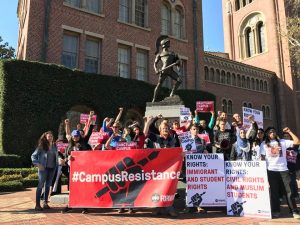Graduate students team with USC Forward to establish union
For many graduate students, the move by Columbia University teaching and research assistants to form a union served as a springboard for a union movement at USC. Students began their involvement with USC Forward, a coalition of students, faculty, alumni and community organizers fighting for a union that will represent USC graduate students.
The mobilization comes off the heels of the August 2016 ruling by the National Labor Relations Board, which decided that graduate students who work as teaching and research assistants at private universities have the right to unionize. The case, spurred by a petition filed by Columbia students who looked to join the United Automobile Workers, reversed a 2004 ruling by the NLRB involving graduate students at Brown University. This older ruling maintained that graduate assistants could not be considered employees because they are first and foremost students, with educational, not economic, ties to their university.
Following the NLRB ruling, graduate students at Columbia chose to unionize in December 2016. According to the United Automobile Workers, which will now represent Columbia graduate students, the vote to unionize was 1,602 to 623.
When USC graduate student Victor Sanchez heard about the Columbia decision, he began organizing with other graduate students who were previously unsure if they even had the right to unionize at a private university.
“The UC system has organized graduate students,” said Sanchez, a research assistant at the Program for Environmental and Regional Equity. “There are things like tuition remission, subsidized child care — all these things that exist. It didn’t become clear until the Columbia decision that we even had that right here at a private university [to unionize].”
Karlynne Ejercito, a graduate student studying American studies and ethnicity who will begin working as a teaching assistant in that department during the next academic year, also emphasized that the desire for a union stems from the fact that many graduate students are married and have started families, and therefore need a body to fight for their access to child care as well as fair wages and racial justice.
“Some of us want to start families,” Ejercito said. “A union is more of a self-determining body that can advocate on behalf of graduate students in terms of pay, child care, in terms of making sure there’s an anti-racist caucus built into the system.”
May Lin, a graduate student studying sociology and public policy, served as a teaching assistant for three semesters in the sociology department before joining PERE as a research assistant. She highlighted the importance of a union as a collective body advocating for just pay, health care and good working conditions.
“A union is a really important way to secure things like healthcare and wages,” Lin said. “Without a union, it’s hard for us to secure the strongest working conditions that we could have. Unionism is a really important vehicle for our well-being and for the University as a whole because we are contributing vital work to the University.”
On March 1, USC Forward hosted a campus resistance event in order to protest the Trump administration’s rhetoric regarding immigrants and call on President C.L. Max Nikias to declare USC a sanctuary campus. According to Sanchez, these protests stem from the fact that the group, in addition to fighting for a union, also needs to respond to other political events happening nationwide that affect students.
“We’re very much grounded in social justice unionism. What [this] means is that we’re not just fighting for a union solely through the lens of workplace bargaining,” Sanchez said. “A union movement has to also have values that are grounded in real social justice needs and part of that is [addressing] the times. You can’t ignore that we have an administration whose rhetoric is vile and discriminatory and bigoted.”
Robert Chala, a graduate student studying sociology and working as a research assistant with Sanchez and Lin at PERE, highlighted that USC Forward, in addition to calling for a graduate student union, is also focused on issues such as diversity at USC.
“One really strong issue that has come up a lot is diversity,” Chala said. “There’s been a lot of movement around creating a more diverse campus, reaching more students of color and creating a supportive environment for them. The University has made a lot of promises around that, but there’s really no accountability to any of those promises and so that’s one of the major benefits of having a union — being able to hold the University accountable to the promises that they’ve made.”
Ultimately, with support from the Service Employees International Union, USC Forward hopes to expand, joining non-tenure track faculty to combat the recent cost-cutting trends in higher education.
“Many of us are headed to non-tenure track faculty jobs,” Chala said. “Those are realistic changes that are happening in the higher education market, so we need to be able to protect ourselves for the future and the present. The present is graduate students building with non-tenure track faculty and putting a halt to the trends in higher education that are treating graduate students and faculty as cheap labor.”



Finish school, then leave school and get a job like a real adult.
The school cocoon is arresting your development.